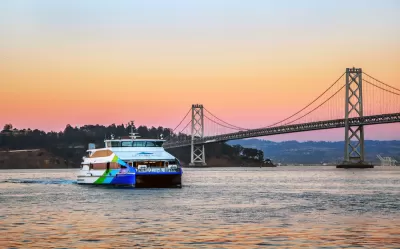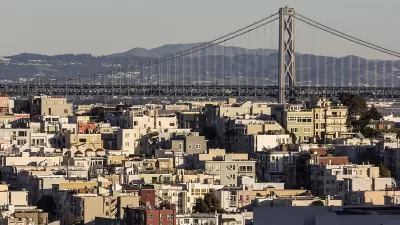A drastic and unprecedented measure included in the draft Plan Bay Area 2050, released this summer, would require 60 percent of all workers in Bay Area office jobs to telecommute.

"In the face of protests from San Francisco officials and advocates of public transit, the Metropolitan Transportation Commission on Wednesday moved forward with a plan to keep many of the region’s workers at home — with climate change, not the coronavirus pandemic, as the rationale," reports Roland Li in a paywalled article for the San Francisco Chronicle.
Specifically, the MTC "voted to include the controversial mandate that large Bay Area employers keep 60% of their workers home each workday as part of a 2050 planning strategy to reduce greenhouse gas emissions and traffic congestion," according to Li.
An article by Laura Bliss for Bloomberg CityLab provides additional analysis of the implications of mandated telecommuting policies.
"The remote-work order is one of 35 strategies in Plan Bay Area 2050, the group’s 30-year roadmap to guide regional transportation funding, as required by state and federal law. The work-from-home directive aims to bring the region’s climate-changing carbon emissions down," writes Bliss to summarize the MTC's rationale for the work-from-home mandate.
The MTC released the draft Plan Bay Area 2050 in July of this year, but the telecommute mandate escaped scrutiny at the time. More detail on the mandate follows:
The 60% benchmark for office workers was designed to bring the telecommute share of the region’s overall workforce as high as 25%, Matt Maloney, the commission’s regional planning director, said during the meeting. With a goal to achieve a 19% reduction in per capita greenhouse gases by 2035, the blueprint’s strategies “must be ones that local governments are poised to deliver,” he said. The telecommuting strategy, Maloney said later, was “one of the most necessary pieces.”
The plan did provoke criticism during its hearing, according to Bliss.
Nick Josefowitz, an MTC commissioner who works as the director of policy at the urbanism think tank SPUR, said that such a mandate would end up punishing workers who share crowded homes with roommates and family members, especially in an exorbitantly expensive housing market with scant inventory. He also questioned the emphasis on telecommuting rather than on non-polluting modes of transport, and warned of impacts on businesses and government coffers that rely on daily infusions of workers.
Bliss's coverage provides many more soundbites from the debate surrounding the telecommuting mandate, and also adds some perspective about the limitations of Plan Bay Area 2050, which would require enabling legislation to enforce each of its many components. "Still, a government-backed work-from-home policy at this scale would be a first for U.S. climate policy, and the mandate’s appearance on this planning document is a landmark in a year of upheaval in the realm of transportation — and in the wake of a summer of environmental catastrophe in California," writes Bliss.
FULL STORY: The Murky Case for Mass Telecommuting

Planetizen Federal Action Tracker
A weekly monitor of how Trump’s orders and actions are impacting planners and planning in America.

Maui's Vacation Rental Debate Turns Ugly
Verbal attacks, misinformation campaigns and fistfights plague a high-stakes debate to convert thousands of vacation rentals into long-term housing.

Restaurant Patios Were a Pandemic Win — Why Were They so Hard to Keep?
Social distancing requirements and changes in travel patterns prompted cities to pilot new uses for street and sidewalk space. Then it got complicated.

In California Battle of Housing vs. Environment, Housing Just Won
A new state law significantly limits the power of CEQA, an environmental review law that served as a powerful tool for blocking new development.

Boulder Eliminates Parking Minimums Citywide
Officials estimate the cost of building a single underground parking space at up to $100,000.

Orange County, Florida Adopts Largest US “Sprawl Repair” Code
The ‘Orange Code’ seeks to rectify decades of sprawl-inducing, car-oriented development.
Urban Design for Planners 1: Software Tools
This six-course series explores essential urban design concepts using open source software and equips planners with the tools they need to participate fully in the urban design process.
Planning for Universal Design
Learn the tools for implementing Universal Design in planning regulations.
Heyer Gruel & Associates PA
JM Goldson LLC
Custer County Colorado
City of Camden Redevelopment Agency
City of Astoria
Transportation Research & Education Center (TREC) at Portland State University
Jefferson Parish Government
Camden Redevelopment Agency
City of Claremont





























